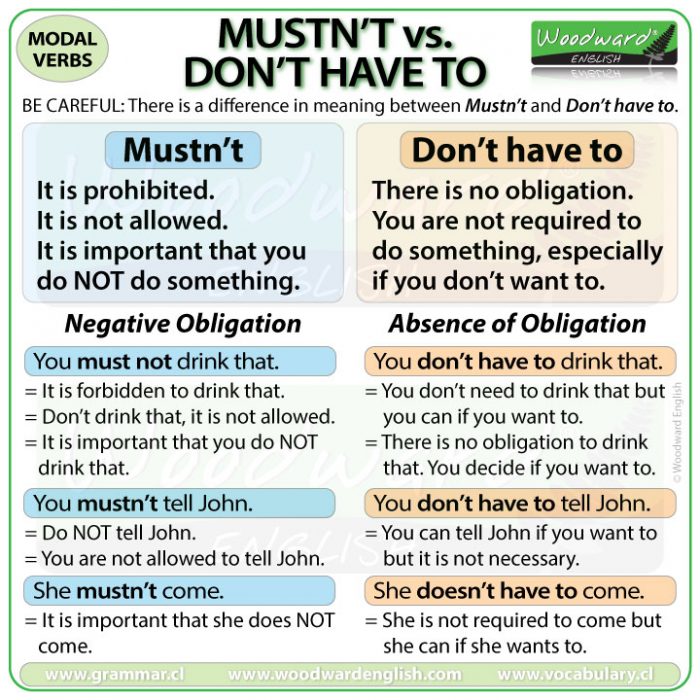
English grammar must and have to mustn t and don t have to Artofit
Differenza tra Mustn't e Dont have to Adesso che abbiamo spiegato quando e come si usano Mustn't e Don't have to, vi andremo a mostrare l'utilizzo di queste forme verbali nella stessa frase, così da notare più facilmente la differenza e come cambia il senso della frase. ESEMPIO: You don't have to get married. Non devi sposarti.

Must Must MUST, MUSTN’T, HAVE TO, DON’T HAVE TO Complete these sentences with must, mustn’t
Differenza tra Must e Have To. You mustn't drive. Non devi guidare. Don't have to è usato per esprimere l'assenza di un obbligo o di una necessità. Nell'esempio in questione gli si sta dicendo che non è obbligato a guidare, ma può farlo se lo vuole (es. se si sente in condizione di guidare o se è un suo desiderio)..

Must, have to, mustn't, don't have to
The difference between MUSTN'T and DON'T HAVE TO in English. Free English Courses; English Teacher Resources; English Articles; Select Page. The difference between MUSTN'T and DON'T HAVE TO in English. The difference between MUSTN'T and DON'T HAVE TO in English. Follow Us. 934k Followers. 214k Followers.

Uso de must en inglés, mustn´t y needn´t Gramática con
8383 Must e have to Il passato è had to. I couldn't come to the party because I had to study. = Non ho potuto venire alla festa perché dovevo studiare. forma negativa è don't / doesn't have to + forma base del verbo e indica che non è necessario fare qualcosa. Ha quindi un valore diverso da mustn't (= divieto). We're going out for dinner.

Must vs. Have To Woodward English Woodward english, Learn english, English lessons
In this video, I show the difference between Mustn't and Don't have to. In the positive, these modal verbs have similar meanings but in the negative they are.

Must vs. Have to Must Not vs. Don't Have to • 7ESL
English ESL video lessons. Mustn't vs. Don't have to: What's The Difference. Let's do English ESL general grammar practice.

MUSTN’T, HAVE TO, DON’T HAVE TO English ESL worksheets pdf & doc
Must/mustn't, have to/don't have to - Form. Download full-size image from Pinterest Must/mustn't Use must + infinitive without to. Must is a modal verb, and modal verbs are followed by an infinitive without to.. I must to go to the doctor.; I must go to the doctor.; No -s. Modal verbs don't add -s after he/she/it.. He must comes with us.; He must come with us.

Mustn’t vs. Don’t Have To Woodward English
N.B. Mustn't si usa per vietare in modo assoluto un'azione. Don't have to viene utilizzato per indicare qualcosa che non è necessaria ma è concesso fare. Es1: You mustn't disturb. Es2: You.

English Grammar Must And Have To, Mustn’t And Don’t Have To
Diversamente da must e have to, che sono praticamente sinonimi, c'è una sottile quanto sostanziale differenza tra mustn't e don't have to. Come detto nei paragrafi precedenti, mustn't introduce qualcosa che NON deve essere fatto. È l'obbligo di non fare qualcosa. Don't have to introduce invece qualcosa che non deve essere fatto.

differenza tra must e have to DIFFERENZA TRA
Be careful with the negative of Must and Have to. There is a BIG difference in meaning between Mustn't and Don't have to. Mustn't means something is prohibited or it is not allowed. Don't have to means there is NO obligation to do something. You are not required to do something, especially if you don't want to. You can do the thing if.

Mustn't vs. Don't have to What is the difference? ModalVerbs LearnEnglish Learn english
Mustn't e don't have to hanno significati diversi. - Si usa mustn't per dire che è proibito fare qualcosa. You mustn't copy during tests. Non devi copiare durantele verifiche. - Si usa don't have.

Uso de must en inglés, mustn´t y needn´t Gramática con
La differenza tra mustn't e don't have to what is the difference between and have to? be careful with the negative of must and have to. there is big difference. Passa al documento.

MUSTMUSTN'THAVE TODON'T HAVE TO Grammar exercises, English exercises, English grammar quiz
Mustn't - Don't have: differenza Discorso diverso per Mustn't e Don't have, la cui differenza è evidente. Mustn't è un obbligo negativo (= è importante che tu NON faccia qualcosa) mentre Don't have to è un'assenza di obbligo. ESEMPIO: You must not eat that. (= it is forbidden to eat that; it is not allowed) Non devi mangiarlo.

Pin en English Grammar
Obligation - Must / mustn't / have to / don't have to. Il presente del verbo 'dovere' in inglese. L'uso di have to e must per parlare di obblighi e necessità nel present. Nella forma.

Must vs. Have to Must Not vs. Don't Have to • 7ESL Teaching english grammar, English grammar
Do not have to, in contrast, suggests that something isn't necessary, that it's a choice. The second speaker is saying that there are many different types of beverages in the world—water, fruit juice, soda, tea, coffee—alcohol is only one among them. If you don't want to drink alcohol, for reasons of taste, health or religion, it isn.

have to must mustn't English ESL worksheets pdf & doc
La differenza tra mustn't e don't have to può sembrare sottile, ma sbagliare l'uso di queste due espressioni può avere implicazioni importanti. Se si usa mustn't al posto di don't have to, si sta indicando un'obbligazione assoluta di non fare qualcosa. Ad esempio, se si dice "You mustn't smoke here", si sta affermando che è assolutamente.